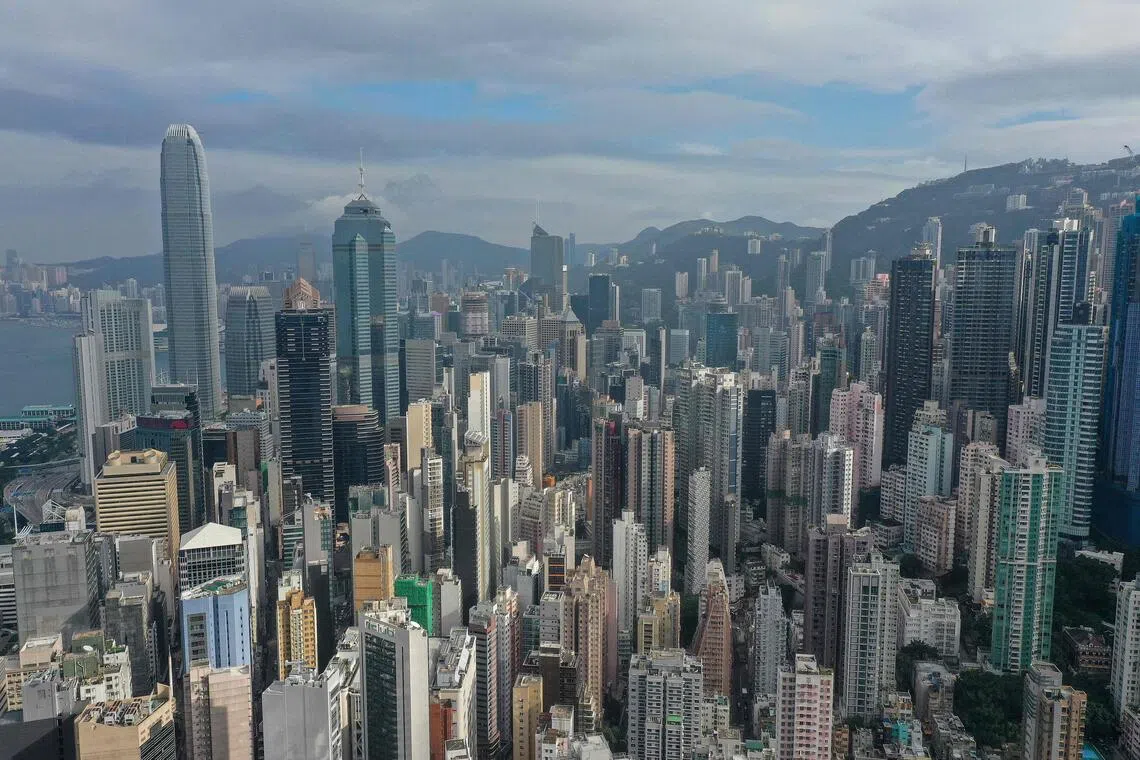Hong Kong property slump reaches city’s coveted luxury homes
Sign up now: Get ST's newsletters delivered to your inbox

Hong Kong’s property slowdown spans residential, office and retail sectors.
PHOTO: AFP
Follow topic:
Hong Kong – Hong Kong, among the world’s least affordable property markets, is in a rare downturn and its extent can be seen in the stark impact on the city’s luxury real estate.
At the Repulse Bay enclave on the south side of the island where some of the world’s priciest homes are located, a 1,875 sq ft apartment is currently listed for HK$95,000 (S$16,780) a month, 17 per cent lower than it was leased for last year. Closer to the central business district, an advertisement taped onto the window of a real estate agency states that it is “facing the reality” by listing an apartment for HK$30 million after a HK$2 million discount.
Hong Kong’s property slowdown
Sales and rental prices are falling, the market is seeing fewer transactions and the number of home viewings has slowed, real estate agencies said.
An exodus of expats, closed borders with the mainland, interest rate hikes and an uncertain global macroeconomic environment have caused luxury residential prices to decline to a 15-month low, according to a price index from Knight Frank. Savills expects high-end home values to correct by 10 per cent this year, and decline another 5 per cent to 10 per cent over 2023. Centaline Property expects only 1,800 luxury homes to be sold this year, the lowest in nine years.
“We are in uncertain and unchartered waters,” said Ms Vivien Chan, founder of the V Group. The developer’s portfolio focuses on luxury serviced apartments and homes in Hong Kong, including in locations such as the Peak. With a range from about HK$50,000 to HK$150,000 per sq ft, the cheaper properties will be more badly hit than the rest.
Knight Frank’s head of residential agency and senior director Maggie Lee said: “Some clients have cash on hand, they are ready to buy, but they say ‘okay, let’s wait and see, I just want to see whether we can see the end of interest rate hikes or the uncertainty clear’.”
Potential clients are moving to cities such as Singapore and Dubai, said Ms Lee, who has 26 years of experience in the Hong Kong luxury property sector.
Outside Hong Kong, prices in some major cities are being propped up by foreign buyers. Americans have cashed in on the weak pound to buy luxury London homes. In Singapore, wealthy buyers from mainland China are pushing up prices amid a broader real estate boom in the city-state.
No quick bounce back
In Hong Kong’s luxury rental market, prices have come off at least 10 per cent from a high, said Ms Victoria Allan, founder of Habitat Property, a real estate agency for luxury homes. The landlord of a property that would typically be rented out for HK$105,000 could now be contented with HK$85,000, she said.
Ms Allan expects the market to soften further, although at a more moderate pace than in the past few months.
“I am expecting it not to turn around as fast as it has in the past,” said Ms Allan. “That is the big difference. In the past, everyone has gone ‘Hong Kong will bounce back’, but I don’t think the framework is there at the moment for Hong Kong to bounce back so quickly.”
Still, the luxury housing market does have some support. Some local residents have taken advantage of lower prices to upgrade to a bigger apartment or a better district, said Knight Frank’s Ms Lee.
Developers and landlords in Hong Kong also have extremely high holding power, meaning they can afford to take a listing off the market if prices are too low and wait it out. At shopping hot spot Causeway Bay, V Group has not sold any of its 64 fully furnished units at its luxury serviced apartment project because offers have not met expectations. The company does not intend to lower prices, said Ms Chan.
She expects a V-shaped recovery once the mainland relaxes Covid-19 restrictions, citing pent-up demand, especially from affluent mainlanders who would usually purchase property in Hong Kong. BLOOMBERG

